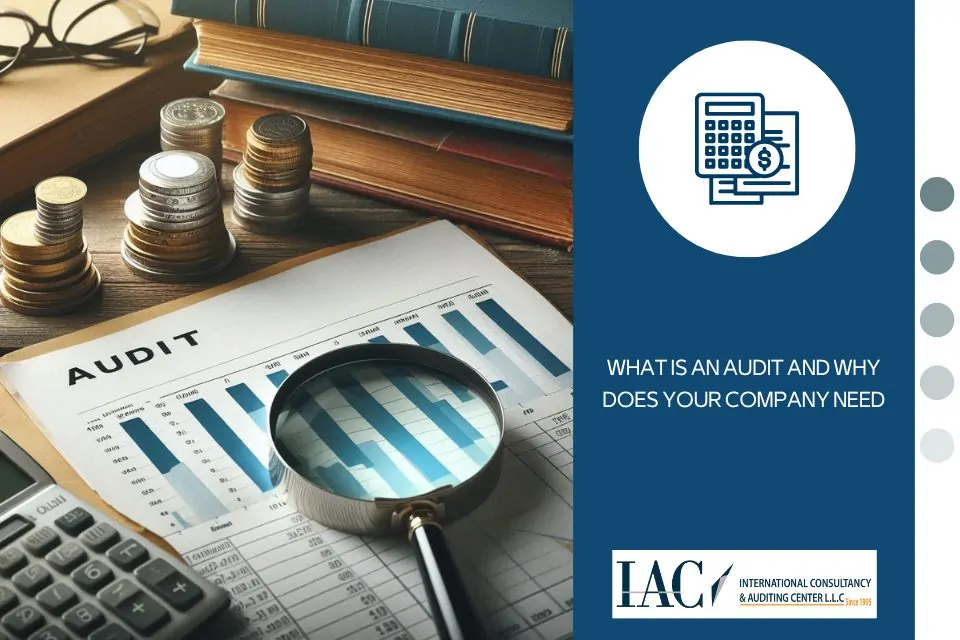What Is an Audit and Why Does Your Company Need?
Auditing is a fundamental process that ensures the accuracy and transparency of a company’s financial data. It is not just a routine procedure or legal requirement—it is a strategic tool that helps build trust with partners, investors, and regulatory bodies. In the UAE, where the market is highly competitive and diverse, audits play a vital role in protecting business interests and ensuring legal compliance.
What Is Auditing?
Auditing is the independent examination and analysis of financial data, such as financial statements and accounting records. It is conducted by a certified external auditor to verify that the financial information accurately reflects the company’s financial position and complies with local and international accounting standards.
Objectives of Auditing
Audits aim to:
- Verify the accuracy and fairness of financial statements
- Detect potential errors or fraudulent activities early
- Enhance the credibility of the company with authorities and investors
- Ensure compliance with laws and financial standards
- Provide recommendations to improve financial performance and internal controls
Types of Audits
1. Statutory Audit (Mandatory)
Required by regulatory bodies in the UAE, such as the Federal Tax Authority. This type of audit ensures compliance with financial regulations and is typically conducted annually.
2. Internal Audit
Performed by an internal team or an external auditor upon management’s request, aiming to strengthen internal controls and ensure the efficiency of financial operations.
3. Operational Audit
Focuses on evaluating the effectiveness and efficiency of financial procedures to help achieve business goals with optimal quality and cost.
4. Tax Audit
Involves reviewing the company’s tax obligations to ensure compliance with tax laws, including VAT and corporate tax.
When Does Your Company Need an Audit?
Companies typically require audits in the following scenarios:
- Filing VAT or corporate tax returns
- Applying for financing or attracting new investors
- Expanding or changing the company’s legal structure
- During liquidation, sale, or partner exit
- When there is suspicion of financial errors or irregularities

The Difference Between Bookkeeping and Auditing
While both bookkeeping and auditing are integral to a company’s financial operations, they serve different purposes.
Bookkeeping is the initial stage of the accounting process where all daily financial transactions are recorded—sales, expenses, receipts, and payments. It focuses on organizing data chronologically and ensuring timely documentation. It requires a solid understanding of accounting principles but does not include a comprehensive evaluation of the data’s accuracy.
Auditing, on the other hand, is a higher-level process carried out by an independent external auditor who examines the records produced during bookkeeping. The goal is to confirm the financial information’s accuracy, integrity, and compliance with applicable standards (such as IFRS) and local laws. Auditing identifies errors, gaps, or even potential fraud, and results in an official report reflecting the reliability of the company’s financial statements.
In essence, bookkeeping is about recording data, while auditing is about independently evaluating that data. Both are essential, but they fulfill distinct roles in the financial transparency and stability of a business.
Benefits of Auditing for Small and Medium Enterprises (SMEs)
Auditing offers numerous advantages for SMEs, including:
- Enhancing the company’s image with banks, partners, and investors
- Early detection of financial and administrative issues
- Facilitating access to loans and financial support
- Minimizing tax risks and avoiding penalties
- Supporting business growth and confident expansion
How to Prepare Your Company for an Audit
To streamline the audit process, companies should:
- Organize all financial records and documents, such as invoices, contracts, and receipts
- Ensure an accurate and up-to-date accounting system is in place
- Collaborate with the accounting team and provide all required documentation to the auditor
- Explain any unusual or exceptional financial transactions
Contact Us
For free consultations and professional auditing services, contact the International Consultancy & Auditing Center at:
Phone: +971 4 250 1521
Additional Line: +971 56 808 6309
Frequently Asked Questions About Auditing
Bookkeeping records daily transactions, while auditing is an independent examination to verify the accuracy and compliance of those records.
It depends on the company type and applicable laws. However, most companies—especially those in free zones or subject to corporate tax—are required to conduct annual audits.
Choose a certified auditor with experience in your industry. You can consult our expert team at the International Consultancy & Auditing Center for guidance.
Auditing ensures compliance with tax laws and helps avoid costly errors and penalties, though it does not directly reduce taxes.
Audit fees vary depending on the size and complexity of your business. At the International Consultancy & Auditing Center, we offer free consultations to assess your needs. What is the difference between bookkeeping and auditing?
Is auditing mandatory for all companies in the UAE?
How do I choose the right auditor for my company?
Does auditing help reduce taxes?
What is the cost of an audit?




